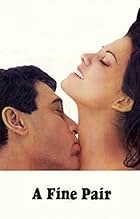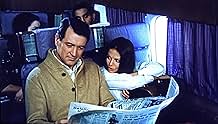A detective gets involved with the beautiful daughter of an old friend. The daughter turns out to be a jewel thief, who in turn gets the detective involved in a caper in Austria.A detective gets involved with the beautiful daughter of an old friend. The daughter turns out to be a jewel thief, who in turn gets the detective involved in a caper in Austria.A detective gets involved with the beautiful daughter of an old friend. The daughter turns out to be a jewel thief, who in turn gets the detective involved in a caper in Austria.
Empedocle Buzzanca
- Officer
- (uncredited)
Frank Leslie
- ?
- (uncredited)
Tony Lo Bianco
- Officer McClusky
- (uncredited)
Storyline
Did you know
- TriviaRock Hudson was on Variety's list of Top Ten Overpriced Stars of 1968.
- GoofsWhen the black and white 8mm home movie that Hudson and Cardinale watch runs out - the end leader that is shown projected is professional lab panel leader that would only turn up on a 16mm print - not on a home 8mm format original film.
- Quotes
Chief Wellman: Would you like to propose a toast?
Capt. Mike Harmon: Yes. Criminals.
[Chief Wellman is shocked]
Capt. Mike Harmon: Without them, we'd all be out of work.
- ConnectionsFeatured in Rock Hudson's Home Movies (1992)
Featured review
Sometime in 1969, I saw trailers for a double bill coming to neighborhood theaters consisting of A FINE PAIR and CHARRO, a western starring Elvis Presley. I eventually saw CHARRO in a theater, but with a different co-feature, so I had to wait a few years before I caught up with A FINE PAIR on television. I watched it again recently because I had a hankering to hear its light, jaunty, melodic Ennio Morricone score again, a refreshing change of pace from the composer's heavier (but richer) score for ONCE UPON A TIME IN THE WEST, which I re-watched a week ago and which, like A FINE PAIR, opened in New York in May 1969. Both starred Claudia Cardinale, but only A FINE PAIR uses the actress's actual voice in the English dubbing. This film is clearly not afraid of her accent.
I enjoyed A FINE PAIR. It's not the most intricate caper film I've ever seen, nor the most comprehensible. It could have used a more stylish director (think what Mario Bava, of DANGER: DIABOLIK fame, could have done with it). Still, I was quite smitten with Claudia's free-spirited character. She smiles a lot, is open and gregarious, and her joy is quite infectious. Rock Hudson plays a by-the-book police captain in horn-rimmed glasses and trenchcoat who gradually falls under her spell, changing his wardrobe and his manner (and his moral code) as he eventually goes along with her schemes. It's a very different style of performance for Mr. Hudson, who was working well outside the comfort zone of Universal Pictures, the studio where he'd been treated as royalty for most of the 1950s and '60s. He's on location for most of this film and far from the amenities he was used to at Universal City. He has a befuddled look much of the time, which certainly suits his character here.
The burgeoning romance between Hudson and Cardinale (who were born about 13 years apart) is given some resonance by the inclusion of a segment of b&w home movie footage where a younger version of Cardinale's character (played by a teenage actress) is filmed on a family outing with her father and Hudson, a friend of the father, and is seen cavorting playfully with Hudson in the throes of an adolescent crush straddling the precarious borderline between innocent and flirtatious.
I was won over early on by a location scene in Manhattan where Hudson and Cardinale have a key meet-up outside the old Commodore Hotel, which once hosted Star Trek conventions that I attended. (The hotel site on 42nd Street and Lexington Avenue is now occupied by the Grand Hyatt.) It seems to have been very cold when they shot the scene, with their breath quite visible. Neither actor is wearing a hat or scarf. And then, instead of suggesting they go inside the warm hotel to talk, they opt to take a walk along Park Avenue to enact their scene. We can see for ourselves the kind of discomfort that even two top stars of the era were likely to experience when they signed on to do a low-budget Italian genre film.
Later on, they show up at Central Park on Fifth Avenue and Hudson is compelled to kick somebody out of a phone booth at the entrance to the park. "Police business," he barks at the hapless caller, before entering the booth to make a key phone call to determine how much time he has to help Cardinale return some valuable jewels to the Austrian estate she stole them from. Now, I've been going to Central Park for decades and I don't recall ever seeing a phone booth anywhere on Fifth Avenue along the park. Sure, the filmmakers could have moved the action to a site nearby that would have been a more likely spot for a phone booth but then I wouldn't have been able to enjoy this glimpse of the park as it looked 44 years ago, roughly the time I began my regular visits there. Kudos to the production designer for exercising dramatic license and providing one of the many small pleasures this film has to offer. The larger pleasures are, of course, Cardinale's performance and Morricone's score. Do we need to ask for more?
Tony Lo Bianco (THE SEVEN-UPS) has a small role as McCluskey, a cop working under Hudson in New York. Tomas Milian, a mainstay of Italian westerns at the time (e.g. THE BIG GUNDOWN), has an amusing cameo as an anarchist friend and sometime lover of Cardinale. The film was a byproduct of its peculiar historical moment, offering a hazy snapshot of its era, and would not have been made in quite this form at any other time. Enjoy it as the time capsule it remains.
I enjoyed A FINE PAIR. It's not the most intricate caper film I've ever seen, nor the most comprehensible. It could have used a more stylish director (think what Mario Bava, of DANGER: DIABOLIK fame, could have done with it). Still, I was quite smitten with Claudia's free-spirited character. She smiles a lot, is open and gregarious, and her joy is quite infectious. Rock Hudson plays a by-the-book police captain in horn-rimmed glasses and trenchcoat who gradually falls under her spell, changing his wardrobe and his manner (and his moral code) as he eventually goes along with her schemes. It's a very different style of performance for Mr. Hudson, who was working well outside the comfort zone of Universal Pictures, the studio where he'd been treated as royalty for most of the 1950s and '60s. He's on location for most of this film and far from the amenities he was used to at Universal City. He has a befuddled look much of the time, which certainly suits his character here.
The burgeoning romance between Hudson and Cardinale (who were born about 13 years apart) is given some resonance by the inclusion of a segment of b&w home movie footage where a younger version of Cardinale's character (played by a teenage actress) is filmed on a family outing with her father and Hudson, a friend of the father, and is seen cavorting playfully with Hudson in the throes of an adolescent crush straddling the precarious borderline between innocent and flirtatious.
I was won over early on by a location scene in Manhattan where Hudson and Cardinale have a key meet-up outside the old Commodore Hotel, which once hosted Star Trek conventions that I attended. (The hotel site on 42nd Street and Lexington Avenue is now occupied by the Grand Hyatt.) It seems to have been very cold when they shot the scene, with their breath quite visible. Neither actor is wearing a hat or scarf. And then, instead of suggesting they go inside the warm hotel to talk, they opt to take a walk along Park Avenue to enact their scene. We can see for ourselves the kind of discomfort that even two top stars of the era were likely to experience when they signed on to do a low-budget Italian genre film.
Later on, they show up at Central Park on Fifth Avenue and Hudson is compelled to kick somebody out of a phone booth at the entrance to the park. "Police business," he barks at the hapless caller, before entering the booth to make a key phone call to determine how much time he has to help Cardinale return some valuable jewels to the Austrian estate she stole them from. Now, I've been going to Central Park for decades and I don't recall ever seeing a phone booth anywhere on Fifth Avenue along the park. Sure, the filmmakers could have moved the action to a site nearby that would have been a more likely spot for a phone booth but then I wouldn't have been able to enjoy this glimpse of the park as it looked 44 years ago, roughly the time I began my regular visits there. Kudos to the production designer for exercising dramatic license and providing one of the many small pleasures this film has to offer. The larger pleasures are, of course, Cardinale's performance and Morricone's score. Do we need to ask for more?
Tony Lo Bianco (THE SEVEN-UPS) has a small role as McCluskey, a cop working under Hudson in New York. Tomas Milian, a mainstay of Italian westerns at the time (e.g. THE BIG GUNDOWN), has an amusing cameo as an anarchist friend and sometime lover of Cardinale. The film was a byproduct of its peculiar historical moment, offering a hazy snapshot of its era, and would not have been made in quite this form at any other time. Enjoy it as the time capsule it remains.
- BrianDanaCamp
- Apr 22, 2012
- Permalink
- How long is A Fine Pair?Powered by Alexa
Details
- Runtime1 hour 53 minutes
- Sound mix
- Aspect ratio
- 1.85 : 1
Contribute to this page
Suggest an edit or add missing content


























